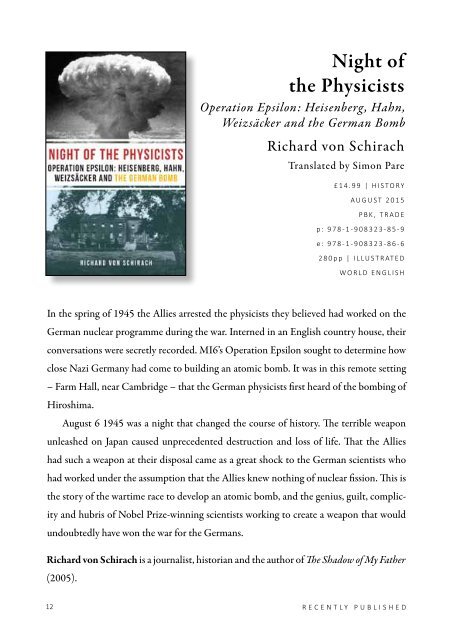Haus Publishing The Armchair Traveller january-june
wm862
wm862
You also want an ePaper? Increase the reach of your titles
YUMPU automatically turns print PDFs into web optimized ePapers that Google loves.
Night of<br />
the Physicists<br />
Operation Epsilon: Heisenberg, Hahn,<br />
Weizsäcker and the German Bomb<br />
Richard von Schirach<br />
Translated by Simon Pare<br />
£14.99 | HISTORY<br />
AUGUST 2015<br />
PBK, TRADE<br />
p: 978-1-908323-85-9<br />
e: 978-1-908323-86-6<br />
280pp | ILLUSTRATED<br />
WORLD ENGLISH<br />
A Night in the<br />
Emperor’s Garden<br />
A True Story of Hope<br />
and Resilience in Afghanistan<br />
Qais Akbar Omar and<br />
Stephen Landrigan<br />
£14.99 | MEMOIR<br />
HBK, TRADE<br />
OCTOBER 2014<br />
p: 978-1-910376-12-6<br />
e: 978-1-910376-20-1<br />
330pp | ILLUSTRATED<br />
WORLD<br />
In the spring of 1945 the Allies arrested the physicists they believed had worked on the<br />
German nuclear programme during the war. Interned in an English country house, their<br />
conversations were secretly recorded. MI6’s Operation Epsilon sought to determine how<br />
close Nazi Germany had come to building an atomic bomb. It was in this remote setting<br />
– Farm Hall, near Cambridge – that the German physicists first heard of the bombing of<br />
Hiroshima.<br />
August 6 1945 was a night that changed the course of history. <strong>The</strong> terrible weapon<br />
unleashed on Japan caused unprecedented destruction and loss of life. That the Allies<br />
had such a weapon at their disposal came as a great shock to the German scientists who<br />
had worked under the assumption that the Allies knew nothing of nuclear fission. This is<br />
the story of the wartime race to develop an atomic bomb, and the genius, guilt, complicity<br />
and hubris of Nobel Prize-winning scientists working to create a weapon that would<br />
undoubtedly have won the war for the Germans.<br />
Richard von Schirach is a journalist, historian and the author of <strong>The</strong> Shadow of My Father<br />
(2005).<br />
In 2005, a group of Afghan actors searched for new opportunities to perform after years of<br />
war and Taliban rule. One was a police detective and a widow determined to create images<br />
of strong women. Another had trained at Kabul University before he fled to Pakistan as<br />
a refugee. A third was a street beggar who had broken hearts around the world in the title<br />
role of the award-winning film Osama, yet she barely knew how to read or write. <strong>The</strong>n<br />
there was the middle-aged housewife whose life-long dreams of being an actress came at<br />
an unspeakable price.<br />
<strong>The</strong>se actors, joined by a half-dozen others, enlisted a French actress visiting Kabul<br />
as their director. For the next five months they worked tirelessly. <strong>The</strong>y extended their<br />
Afghan passion for poetry to encompass one of Shakespeare’s most lyrical plays, Love’s<br />
Labour’s Lost, in their own Dari language. For the first time in thirty years, men and<br />
women would appear on stage together. This is their story.<br />
Qais Akbar Omar is the author of the internationally acclaimed memoir A Fort of Nine<br />
Towers and is currently a Scholars at Risk Fellow at Harvard. Stephen Landrigan is a<br />
playwright and former journalist for <strong>The</strong> Washington Post and BBC Radio.<br />
12 RECENTLY PUBLISHED<br />
RECENTLY PUBLISHED<br />
13


